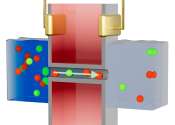Huge drone set to launch satellites in mid-air
We all have images in our mind of rocket launches from Cape Canaveral Air Force Station hurtling astronauts into space and satellites into orbit.
Engineering

We all have images in our mind of rocket launches from Cape Canaveral Air Force Station hurtling astronauts into space and satellites into orbit.
Hi Tech & Innovation

A team of researchers working at Stanford University has used prior research involving the means by which gecko's climb walls to create pads that allow a human to do very nearly the same thing. In their paper published in ...
Energy & Green Tech

There is a largely untapped energy source along the world's coastlines: the difference in salinity between seawater and freshwater. A new nanodevice can harness this difference to generate power.
Sep 24, 2023
0
407
Engineering

Seventy-five years ago, a sonic boom thundered for the first time over the high desert of California.
Oct 18, 2022
0
2104
Computer Sciences

Computer scientists at University of California, Davis, Maynooth University in Ireland and the California Institute of Technology have created DNA molecules that can self-assemble into patterns essentially by running their ...
Mar 20, 2019
0
1728
Engineering

Here's how to build a whirligig: Thread a loop of twine through two holes in a button. Grab the loop ends, then rhythmically pull. As the twine coils and uncoils, the button spins at a dizzying speed.
Jan 10, 2017
1
1905
Security

A bandit story of the cryptocurrency kind was a popular item on tech sites this week, with staggering amounts of money scooped up by some blockchain bandit, and spotted by security consultants, Independent Security Evaluators.
Poland's Defense Ministry said Friday that a massive leak from a military equipment database includes only publicly available information and is not harmful.
Jan 14, 2022
0
4
Computer Sciences

(Tech Xplore)—IBM and the Air Force Research Laboratory are working to develop an artificial intelligence-based supercomputer with a neural network design that is inspired by the human brain.
Consumer & Gadgets

Apple's MacBook team has announced the development of a force-sensitive input structure for electronic devices, recently approved by the United States Patent and Trademark Office.
In physics, a force is any influence that causes an object to undergo a change in speed, a change in direction, or a change in shape. In other words, a force is that which can cause an object with mass to change its velocity (which includes to begin moving from a state of rest), i.e., to accelerate, or which can cause a flexible object to deform. Force can also be described by intuitive concepts such as a push or pull. A force has both magnitude and direction, making it a vector quantity. Newton's second law, F=ma, was originally formulated in slightly different, but equivalent terms: the original version states that the net force acting upon an object is equal to the rate at which its momentum changes.
Related concepts to force include: thrust, which increases the velocity of an object; drag, which decreases the velocity of an object; and torque which produces changes in rotational speed of an object. Forces which do not act uniformly on all parts of a body will also cause mechanical stresses, a technical term for influences which cause deformation of matter. While mechanical stress can remain embedded in a solid object, gradually deforming it, mechanical stress in a fluid determines changes in its pressure and volume.
This text uses material from Wikipedia, licensed under CC BY-SA